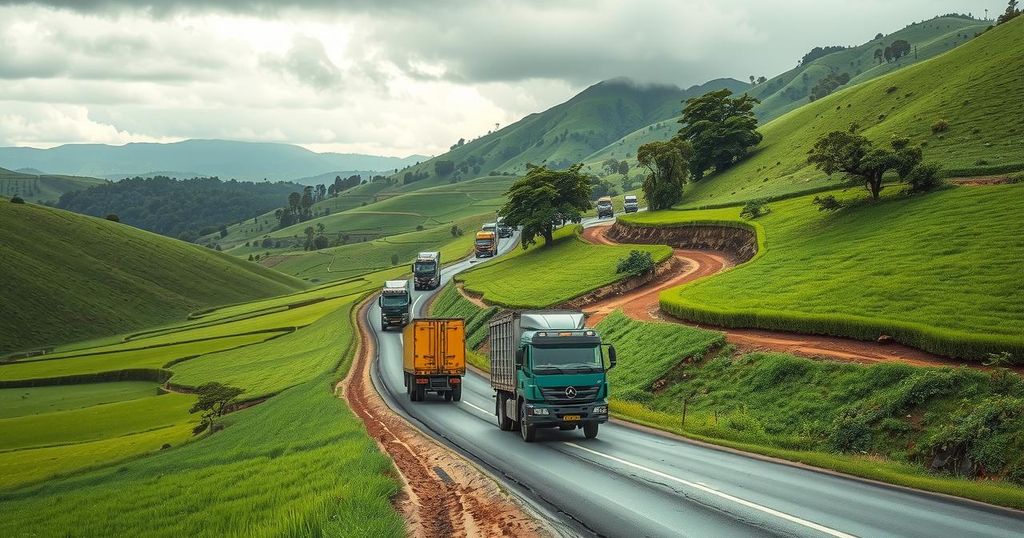Significant Impact of DRC Conflict on Rwandan Truckers and Exporters

The ongoing conflict in eastern DRC is heavily impacting Rwandan truckers and exporters who face hostility, safety concerns, and interruptions to trade routes. Businesses are incurring significant losses as security issues persist, while there are beginnings of optimism for a return to normalcy in the region.
Rwandan truckers and exporters are significantly affected by the ongoing conflict in the eastern Democratic Republic of Congo (DRC). These transporters face hostility from local populations and apprehensive customers due to the escalating violence, making it increasingly dangerous to operate in the region.
Olivier Munyemana, a seasoned lorry driver, has been navigating the route from Dar Es Salaam to DRC for eight years. However, with the resurgence of the M23 armed group and their seizure of key areas, including Goma and Bukavu, Munyemana has decided against making the crossing, fearing for his safety and his vehicle. He underscores the risks, stating, “I can’t risk my life or lose my truck. We have had cases of trucks being burned and drivers attacked.”
The Rwandan government interprets the M23’s advance as a necessary measure to eliminate a Rwandan militia that threatens national security. Meanwhile, the DRC accuses Rwanda of pursuing regime change and exploiting the region’s mineral resources. Regardless of the underlying intentions, these tensions are detrimental to trade.
Statistics from the National Institute of Statistics indicate that DRC is Rwanda’s second-largest trading partner, with goods valued at $156 million exchanged in the first three quarters of 2024. Anjia Prefabricated, a significant cement factory in Rwanda, relies on imports of clinker from DRC, but operations have been halted due to the conflict.
According to Israel Byiringiro, the head of procurement at Anjia, supply routes have become compromised due to security concerns. With dwindling stocks, they are forced to resort to a more expensive transit route through Tanzania, significantly extending their logistics by 800 kilometers.
Rwandan companies also report a decline in customer bases as construction firms in conflict zones like Bukavu and Goma either faced direct attacks or abandoned their operations. Davis Twahirwa, a sales leader for Cimerwa cement, noted that many customers have sustained substantial losses, including theft and destruction of their assets amid the chaos.
Amidst these challenges, Twahirwa indicates a potential shift towards normalcy in Goma as M23 stabilizes its hold on the region. He confidently stated, “Normalcy is returning, and we have resumed selling in both markets, primarily in Goma. Bukavu is also slowly returning, and we hope to ramp up by mid-March fully.”
The tumultuous situation has dire financial implications for Rwandan truckers, who initially invested heavily to serve the growing markets in East Africa. Abdul Ndarubogoye, the president of the Rwanda Transporters Association, lamented, “This has cost transporters and traders a lot of money; some truckers were trapped there in the war zone, which caused major delays.”
With Rwandan-owned trucks constituting 40 percent of those trafficking into eastern DRC, the risks posed by anti-Rwandan sentiments make their operations increasingly precarious.
The conflict in the eastern Democratic Republic of Congo has resulted in significant challenges for Rwandan truckers and exporters. Increasing hostility and security concerns have interrupted trade routes, leading to financial setbacks for businesses dependent on this critical market. However, as stability gradually returns, there is cautious optimism about resuming operations and revitalizing trade in the region. The situation remains dynamic, necessitating ongoing vigilance and strategic adjustments by the transport sector.
Original Source: www.arabnews.com








